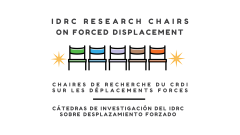The IDRC Research Chairs Network on Forced Displacement is a community of twelve scholars based at universities in countries experiencing mass displacement. Together, they are reframing the narrative of forced displacement and transforming the field of forced migration studies to mainstream Global South perspectives, using evidence-based research and analysis. By centering the needs, demands, voices and values of displaced persons and their communities in a climate of mutual cooperation and understanding between all stakeholders, they seek a paradigmatic shift in global policy discourse and practice.
Together, we acknowledge the deeply interconnected and interdependent nature of the nexus between climate change and forced displacement. Building on existing Global South agreements, tools, fora and knowledge; Adopting and endorsing the conclusions of the Global South Summit on Climate Displacement, held by the research chair at Mohammad VI Polytechnic University in Rabat from 1-3 November 2023; Seeking to draw on best practices from the Global South, we urge governments, international organizations and the international community to commit to:
- Ensure that responses to climate and environmental displacement are localized, situational and country specific;
- Encourage the comprehensive management of environmental displacement policies including the governance of natural resources, disaster response, migration and forced displacement;
- Integrate local perspectives (refugees, host communities, migrants, displaced and stateless persons) at every level and stage of national adaptation and mitigation policymaking;
- Centre decolonial and indigenous knowledge and practices in climate displacement and environmental policy (including natural resource and land use), and place indigenous expertise at the forefront of climate solutions.
- Integrate considerations of race, gender, and diverse identity intersections with climate change and displacement;
- Foster a positive narrative around climate displaced persons and host communities;
- Promote collaboration and mechanisms for partnership among State actors, civil society, private sector and impacted individuals;
- Capitalize on regional integration mechanisms to encourage regional solutions;
- Promote South-South platforms on climate displacement at national, regional, and global levels for learning, coordination, and best practices;
- Ensure that research, data and statistics on the nexus between climate and displacement are publicly available, and incorporate climate change impact analyses in all research and publications.
IDRC Chairs:
1. Fouad M. Fouad, Faculty of Health and Sciences, The American University of Beirut (AUB), Lebanon
2. Houwayda Matta Bou Ramia, Lebanese School of Social Work, Université Saint-Joseph de Beyrouth (USJ), Lebanon
3. Abebaw Minaye, College of Education and Behavioural Studies, The Addis Ababa University (AAU), Ethiopia
4. Opportuna Kweka, Department of Geography, The University of Dar es Salaam (UDSM), Tanzania
5. Hiram Angel, Departamento de Políticas Públicas, Universidad de Guadalajara (UdeG), Mexico
6. Luisa Feline Freier, Associate Professor of Political Science, Universidad del Pacífico, Peru
7. Nyi Nyi Kyaw, Regional Center for Social Science and Sustainable Development, Faculty of Social Sciences, Chiang Mai University, Thailand
8. Paula Banerjee, Gender and Development Studies, Asian Institute of Technology (AIT), Thailand
9. Mary B. Setrana, Centre for Migration Studies, University of Ghana, Accra, Ghana
10. Amal El Ouassif, Mohammed VI Polytechnic University, Rabat, Morocco (interim chair)
11. Alain Tiga Ouedraogo, Chaire de Recherche sur les Déplacements Forcés en Afrique de l’Ouest, Université Joseph KI-ZERBO, Burkina Faso
12. Desiree del Rosario, Centro de Estudios de Género del Instituto Tecnológico de Santo Domingo (CEG-INTEC), Cátedra Sergio Vieira de Mello in República Dominicana (UNHCR de Mello Chair); Climate Change Chair
The research chairs network is supported by Canada’s International Development Research Centre (IDRC). The views expressed herein do not necessarily represent those of IDRC or its Board of Governors.

